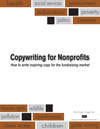Yes, ignore your donors unless it’s time to raise more funds; then just ask for the money. They should know you’re too busy for anything else, right?
Donors shouldn’t expect a thank you note. It’s an added cost and takes precious time.
Donors should somehow know you’re only a 1 or 2 person development staff that’s over worked. They don’t have any problems in their perfect donor world and ought to be totally focused on you.
Of course donors read everything you send them – and remember every detail about your nonprofit. Why bother reminding them of anything? No time for that!
What could be more important in their life than your nonprofit? Surely you have their undivided attention.
Don’t waste time telling donors they’re important. That’s obvious, isn’t it?
Just ask for the money. Don’t go into a lot of detail on the need . . . for goodness sake that’s obvious to anyone!
Yup. Ignore your donors.
Donors are a dime-a-dozen. Don’t bother with stewardship, cultivation, gratitude, or relationship building. Don’t bother to listen when they ask you to cut them out of specific campaigns (e.g., telemarketing; monthly appeals); or when they ask you to only contact them once a year. Who has time for that nonsense?
You’re not running a Burger King. Donors can’t have anything their way. It’s the nonprofit way or the highway.
If they don’t give a donation then there’s something wrong with them. Can’t be anything else!
Or can it?

{ 1 trackback }
{ 4 comments… read them below or add one }
This is a great post. In fact, I love this post. It was terribly uncomfortable to read, however, it identifies many key issues that smaller non-profits overlook. I feel smaller non-profits focus on their organizational needs rather than donor needs. Every donor should be considered a sponsor and treated like one.
Thanks Matt. And I wrote it hoping it would create discomfort in the reader. I wanted to shake things up a bit and show how donors view weak or absent cultivation; even when they don’t know it’s called cultivation or stewardship. Donors just know when they’re not being treated they way they want to be treated.
Great post, Karen. You’d think that nonprofits, even little ones, would know better by now, but they don’t. I get surprised every day by these mistakes.
Thanks, Joanne.
My theory is that the folks working at nonprofit orgs are too close. They live and breathe the mission every day and find it difficult to step away and view the situation from the donor’s perspective.
And they are swamped with daily pressures (e.g., raise more funds NOW) and forget that not making time for cultivation and gratitude hurts their fundraising efforts in both the short and long term.
I wrote another related post on this topic: Do strangers receive more courtesy than your donors?